Malcolm R. Campbell's Blog, page 82
March 9, 2021
Good, the U.S.S. Nimitz is finally home
“We the unwilling, led by the unqualified to kill the unfortunate, die for the ungrateful.” – Unknown Soldier
The U.S.S. Nimitz has returned to the United States after a record-setting 99,000-mile deployment of almost a year. Even though our Vietnam-era aircraft carrier deployments lasted nine months, I have a notion of how the sailors on board feel during the approach to Bremerton, Washington.
[image error]While carrier deployments are always dangerous, they usually don’t face the risks our ships faced during World War II. Nonetheless, I doubt most civilians have the faintest idea what it’s like to be gone 9-12 months aboard a Navy ship. Some sailors aren’t happy when people come up to them in airports and on the street and say, “Thank you for your service.” It comes down to “thank you for your service” sounds like a throw-away phrase similar to “how’s it going?”
The first time I came back from Vietnam, the ship arrived at the former Navy base in Alameda, California. Those near the pier were happy to see us, consisting mostly of family and friends. The second time I came back from Vietnam, I flew home for a change of duty assignment. As the military got off the plane, we had to walk a gauntlet of protestors jeering at us, spitting on us, and calling us baby killers.
Thank goodness the sailors and marines on board the Nimitz didn’t face that kind of “greeting.” On the other hand, in the 1960s, we came home to a world we knew–people who hated us–while today’s sailors are coming home to a world that’s changed since they left: COVID.
COVID is probably worse because it’s killed more people at home than are dying in most theaters of war. What a paradox.
I remain hopeful that President Biden will bring the troops home from Iraq, Afganistan, and the war of nerves and posturing in the South China Sea. I think the costs of all that in dollars and lives are unnecessary and that our efforts are better applied to problems at home. We need not police the World.
As a pacifist, I wonder why more people don’t feel the same way instead of acting angry, unaware, or ungrateful to those who go in harm’s way.
 My Vietnam novel is unlike most because it focuses on the lives of sailors rather than battles. The ship on the cover is a flight-deck photo of the U. S. Ranger. the ship I served on board.
My Vietnam novel is unlike most because it focuses on the lives of sailors rather than battles. The ship on the cover is a flight-deck photo of the U. S. Ranger. the ship I served on board.
March 7, 2021
Oh no: Somebody kicks open a classroom door and shoots the teacher
In these messed-up times of school shooters, one might believe an active crime scene is in progress if somebody kicks open a classroom door and shoots the teacher. It’s hard to imagine now that people kicking open the doors of an English or journalism class were doing it on the teacher’s behalf to prove how unreliable eyewitness testimony is.
I’d heard about the practice from my father who was a college journalism dean. So I was surprised when my college English teacher did it. I knew the minute the door flew open that the entire argument and shooting were a staged event, so I took notes while it happened rather than doing the natural thing by just trying to stay out of the way.
Eyewitness testimony seems like it should be flawless. English teachers don’t care about the science behind the reason why such testimony is usually terrible even though it puts a lot of people in jail.
After the “bad guy” left the classroom and the professor stood up and said, “No, I really didn’t get shot,” he asked us to spend the next 20 minutes (without consulting any other student) writing down what happened. Of course, the professor knew what happened: he had a script. The video camera in the back of the room “knew” what happened because it had a tape of the event.
Each of us was asked to stand up and read our account of the event. Suffice it to say, what we think we saw was wildly different. Then the professor played the videotape, proving–with a smirk–that most of the students didn’t have a flue what happened.
 In “real life,” my professor didn’t have a globe.
In “real life,” my professor didn’t have a globe.My account was spot on. The professor was ticked off and asked how I perfectly recorded the sequence of events correctly. I told him that his little skit was as old as the hills so the minute it started I knew it wasn’t real. I took notes rather than reacting.
He wanted to give me an F for “cheating,” but he just couldn’t quite do it, and–in fact–he seemed relieved that I wasn’t calm and cool under fire because I was a macho cop but because I knew I was basically watching a play.
The other students were not astonished when I turned out to be the “perfect” eyewitness; they were not only embarrassed because they had not only been fooled by a skit but couldn’t even remember what really happened.
Naturally, no teacher would create such a skit today unless s/he left out the guns and the threats. So maybe some guy just kicks open the classroom door and says, “I ain’t got no bananas” and then gets into an argument with somebody who supposedly ordered them on his/her cell phone. Lacks punch, doesn’t it?
What the teacher proved, and what many defense attorneys would like to prove, is what effective authors already know: seeing is not believing. Knowing this, we can stage our short story and novel scenes accordingly. We can use to our advantage the characters’ probably faulty memory–as well as the readers’.
The tag line on Campbell’s website is “In Magic is the Preservation of the World.” That tells you all you need to know about his novels.
March 6, 2021
Favorite movies fading into the past
“So we beat on, boats against the current, borne back ceaselessly into the past.” – F. Scott Fitzgerald in The Great Gatsby
One thing I’ve noticed while growing older is that many of the films I thought would be remembered for all time are more or less unknown to everyone under thirty.
The TCM Channel on DISH shows a lot of these old films, my favorites generally being those on the Noir Alley segment. I find that only film aficionados have heard of most of the films and actors I like and “grew up with.”
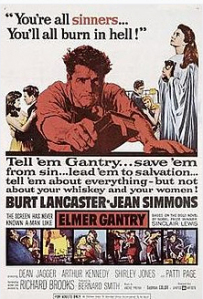 Today’s films attract attention. I think every generation has probably felt this way. So, when I mention on Facebook that my wife and I watched such and such, the general reaction is “say what?” or “who is Burt Lancaster?”
Today’s films attract attention. I think every generation has probably felt this way. So, when I mention on Facebook that my wife and I watched such and such, the general reaction is “say what?” or “who is Burt Lancaster?”
I liked the 1960s drama “Elmer Gantry,” for example. It did well even though it didn’t contain much of Sinclair Lewis’ book. Today, the movie is more or less unknown along with many others that included Burt Lancaster and that were well received.
My parents used to talk about old movies, but since they weren’t readily available on cable and satellite TV channels then, I never had a chance to see most of them when I was young. Now I can see them long after my parents are gone.
I wish I could have watched some of my parents’ favorite movies while my parents were alive. I’m not sure that today’s young people will care much about the movies and books my generation liked while growing up. Today’s memories seem shorter, less concerned with “the old days,” and more focused on this moment.
That’s okay, I guess, but also sad as some of the best we knew fades into the mists of time.
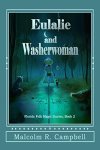 Everything we write is fleeting, here today and gone tomorrow, and yet, it’s still there waiting for readers.
Everything we write is fleeting, here today and gone tomorrow, and yet, it’s still there waiting for readers.
March 5, 2021
Are professional chefs nasty?
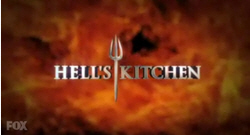 If you watch “Hell’s Kitchen” with Gordon Ramsay or “Chopped” hosted by Ted Allen, perhaps you’ve noticed that a fair number of the contestants on both shows present themselves as badass competitors who will wipe the floor with the scum they’re competing against.
If you watch “Hell’s Kitchen” with Gordon Ramsay or “Chopped” hosted by Ted Allen, perhaps you’ve noticed that a fair number of the contestants on both shows present themselves as badass competitors who will wipe the floor with the scum they’re competing against.
Ramsay, of course, is well known for his volatile, profanity-filled approach to the show while the “Chopped” host and judges are unfailingly polite.
What my wife and I wonder is this: in “real life” away from the TV shows, are the chefs who appear nasty, or are they simply posturing like school-yard bullies on TV? For all I know, maybe the shows’ producers force them to act like people raised in a bad-neighborhood gang.
I know one thing for sure: If I go to a fine restaurant, I don’t want any of these chefs getting close to my food. As best I can tell, Gordon Ramsay and the judges on chopped really know how to cook, though they do like meat that’s too rare for me. Many of the contestants, who hold chefs’ jobs around the country, seem to know how to cook as well.
But the language, the arrogant posturing, and the excessive number of tattoos are a turnoff. Yes, I know, at my age I’m out of sync with everyone who’s 40 years younger. But I do know how to cook without making what happens in the kitchen sound like a gangland activity.
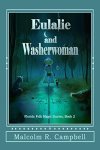 Pat Conroy knew how to cook, and you can find evidence of that in his novels. I can’t cook at Conroy’s level, though I still hope you enjoy my books.
Pat Conroy knew how to cook, and you can find evidence of that in his novels. I can’t cook at Conroy’s level, though I still hope you enjoy my books.
March 4, 2021
My reference shelf: ‘Brewer’s Dictionary of Phrase & Fable’
Originally published in 1870 by the Reverend E. Cobham Brewer, it was aimed at the growing number of people who did not have a university education, but wanted to understand the origins of phrases and historical or literary allusions. The ‘phrase’ part of the title refers mainly to the explanation of various idioms and proverbs, while the “fable” part might more accurately be labelled “folklore” and ranges from classical mythology to relatively recent literature. On top of this, Brewer added notes on important historical figures and events, and other things which he thought would be of interest, such as Roman numerals. – Wikipedia
Prior to the Internet’s arrival allowing us to Google almost anything, I found this book to be a handy (and often distracting reference) for tracking down the origin or meaning of popular phrases, people, odd words, and the other kinds of stuff that authors ponder.
For example, from my 14th edition published in 1989, here are a few entries:
About the size of it: “How matters stand, approximately the facts of the case.”Adamastor: “The spirit of the Cape of Storms (Cape of Good Hope), described by Camoëns (1524-1580) in the Lusiads, who appeared to Vasco da Gama and foretold disaster to all attempting the voyage to India.”Blue-pictures: “Indecent cinema shows. The name derives from the custom of Chinese brothels being painted blue externally.”Cracked pots last longest: An old proverb. Long-sufferers from ill health or some disability often outlive the seemingly fit and healthy.”For authors, the book is a gold mine. I’ve shown only a few short entries here that will fit in this post. Some of the entries’ definitions often go on for multiple paragraphs and include cross-references. Many entries include similar words or phrases that alphabetically follow the first.
Here’s the publisher’s description for the most recent edition:
‘This is, in fact, not what you were looking for; but it’s much more interesting’ Terry Pratchett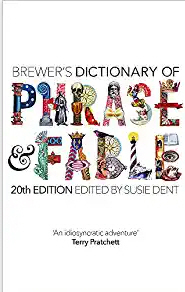 Much loved for its wit and wisdom since 1870,Brewer’s Dictionary of Phrase and Fable takes you on a captivating adventure through its trademark blend of language, culture, myth and legend. Nowhere else could the histories of the guillotine and Guinness stout sit so comfortably alongside the KGB and the Keystone Kops. Brewer’s is a catalogue of curiosities and absurdities that, over almost 150 years in print, has acquired near-mythical status.
Much loved for its wit and wisdom since 1870,Brewer’s Dictionary of Phrase and Fable takes you on a captivating adventure through its trademark blend of language, culture, myth and legend. Nowhere else could the histories of the guillotine and Guinness stout sit so comfortably alongside the KGB and the Keystone Kops. Brewer’s is a catalogue of curiosities and absurdities that, over almost 150 years in print, has acquired near-mythical status.
Edited by Susie Dent, this new edition includes a brand new Collection of Curious Words and many new and updated entries. Its pages brim with esoteric and entertaining oddities – everything from curious customs to the world of newspapers and political alliances of yesteryear – all seen through the distinctive Brewer lens.
This twentieth edition of Brewer’s Dictionary of Phrase and Fable encapsulates all the charm and wit that characterise its predecessors and maintains the standards of scholarship and eclecticism that have long been its hallmark.
Whether you’re a committed Brewerphile or a newcomer to its pages of fascinating entries, this edition will draw you in and keep you glued to its rich mix of eccentric nuggets.
As Susie Dent explains in the foreword, Brewer’s “is unlike any other reference book that exists, anywhere.”
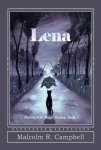
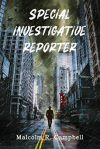 If you read all of my books (why not start today?), you’ll probably discover that I’ve made use of Brewer’s Dictionary.
If you read all of my books (why not start today?), you’ll probably discover that I’ve made use of Brewer’s Dictionary.
March 3, 2021
Memories of my first novel
I wrote my first published novel in 1980. I called it The Sun Singer and found an agent for it. The agent, who ran a one-person shop, liked the novel and accepted it. However several months later, she wrote and said I would have to wait a while before she could actively promote it because another author whom she represented suddenly had a bestseller and that was requiring all of the agent’s time.
I’m glad I didn’t wait for her to finish working on The Clan of the Cave Bear since it went through many sequels. So, I extracted the novel from the agent and it sat until I first published it via iUniverse in 2004. The book’s reception was pretty good, including ending up as a finalist Foreword Magazine’s book of the year awards.
 Wikipedia Photo
Wikipedia PhotoIf you’ve been reading this blog for years–or its predecessor blog on Blogger–you know already that the plot for this novel came to me when I was in junior high school just after a visit with my grandparents and parents to Allerton Park in Illinois. Allerton is the home of a famous statue called The Sun Singer. On the way home from the park, a horrid thunderstorm hit and the images of the statue (and others at Allerton) flashed on and off outside the car window as though somebody were operating a giant strobe light.
For many nights afterward, those images became part of my dreams, dreams that were somewhat psychic for a while (long before I knew much about precognitive dreams) and suddenly I was seeing a young man who lived in Decatur, Illinois (where my grandparents lived) who went on a journey to a nearby universe where he became known as “The Sun Singer.” The novel is set in Glacier National Park.
In 2010, several traditional publishers expressed an interest and it ended up with Vanilla Heart Publishing until I left that company and self-published the book in 2015 because it had been around too long to another publisher to risk bringing out again.
The book is a contemporary fantasy as well as a hero’s journey novel. That is to say, that while what the hero does in terms of action is important, how he changes is even more important. The general sequence of events on such a journey was published years ago in Joseph Campbell’s Hero With a Thousand Faces.
I have two things to confess: (1) I have refused to read The Clan of the Cave Bear, and (2) The Sun Singer is my favorite book. A first novel is, I think, rather like a first love. One never forgets either one regardless of how things go later. I like what I’ve written since 1980, but still, a first novel is always the first novel no matter how many books come after it.
March 2, 2021
Small publishers need a way to close while treating authors fairly
What happens to the authors, illustrators, copy editors, book formatters, and others who have an-going contracts when a one-person publisher closes down, especially unexpectedly?
 I believe a publisher should have a close-down procedure in place should they suddenly pass away or become critically ill. That is, a family member, friend, or attorney should be given in advance the information and power needed to close the doors after informing authors and others of the closure and–importantly–ensuring that all unpaid royalties are paid and that 1099s get sent after the end of the current calendar year. The Small Business Administration has some guidelines here. Most states have similar information available via their secretary of state or other department charged with overseeing businesses of various types.
I believe a publisher should have a close-down procedure in place should they suddenly pass away or become critically ill. That is, a family member, friend, or attorney should be given in advance the information and power needed to close the doors after informing authors and others of the closure and–importantly–ensuring that all unpaid royalties are paid and that 1099s get sent after the end of the current calendar year. The Small Business Administration has some guidelines here. Most states have similar information available via their secretary of state or other department charged with overseeing businesses of various types.
I found out–quite by accident–that my former publisher whom I’ll identify here as VHP closed down last summer due to the owner/editor’s sudden debilitating illness. Since two of my audiobooks are still under the control of VHP and were still paying royalties, I believe all of VHP’s authors should have received a letter informing them of the closure. It could have been sent by a family member or an attorney and included a statement about royalties still due at the time of the closure and/or after the closure when books are still being purchased at online sellers.
In cases where original contracts were unclear and/or still being written, it would also help authors if reversion rights letters were prepared in advance to be sent via e-mail and USPS mail stating that the company has closed and to confirm that all rights belong to the authors; these letters should include information about the publisher’s contracts with the narrators of audiobooks and when those contracts expire.
I cannot query VHP about any of this because the postal and e-mail addresses were closed down.
If a small publisher accepts your book, it makes sense to find out what will happen to your book if that publisher closes for any reason. Since it’s rather an awkward question, publishers could help their authors by not only making sure close-downs are planned for and also by informing authors that such procedures are in place.
Authors work hard on their books so casting those authors to the winds is not my view of a proper business-shut-down plan for a small company.
–Malcolm
March 1, 2021
does anyone have Mother Nature’s cell phone number?
The trouble began when I called Mother Nature “Baby Cakes.”
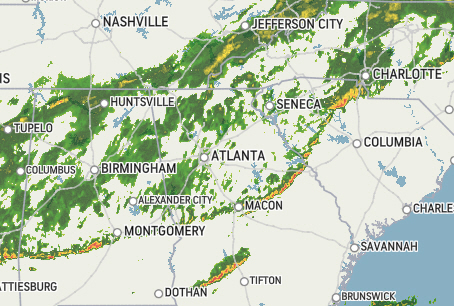
Baby Cakes knows that I do my grocery shopping on Mondays to get it out of the way so I can spend the rest of the week drinking Scotch. Yet look at today’s RADAR. It looks pretty much like last Monday’s RADAR. And the Monday before that. Coincidence? I think not.
I’ve tried multiple times to arrange peace talks. Mother Nature simply laughs even though I’ve told her the Geneva Convention applies to our “situation.”
I want dry groceries and a car that doesn’t smell like wet Brussels sprouts. Last week there was so much water in the car that my veggies got saturated with the contents of a sack of Miracle-Gro and were ten times their normal size by the time I got home. Basically, I had a cord of salad materials, including carrots the size of lodgepole pines.
I live in a respectable neighborhood in which people don’t tolerate things that are weird like oversized veggies. So, Baby Cakes and I really need to hold serious peace talks. I’ve suggested the stadium at Berry College, but she wants a larger venue. Okay, well the Atlanta Braves have a farm team here in Rome, Ga, but she (you know who I mean) wants more.
My response was “To hell with that.”
Her response to my saying “To hell with that” was “When the floods come, I’ll remind people you weren’t willing to find a compromise.”
Look, I’m just too wet and too pissed off to find a compromise, plus I’m still trying to dry out the bread in the oven. So far, everything looks like toast.
I love nature. But sometimes nature gets a little full of itself.
February 28, 2021
against the tides
When my brothers and I were in elementary school and spent a day at the beach, we’d swim, look for shells, catch blue crabs to eat, and if any of our friends were around with a boat, we might head out to the scallop bar 2/3 of we way across the Apalachee Bay.
 Invariably–ff the tide was out–we’d build a fort at low tide where the seaweed on the beach showed the high tide’s level would be when it came back in. We hoped that one day our study sand fort would stand against the tides. It never did. We always lost the battle no matter how much extra sand we added as the waves rolled in. We always lost faster against spring tides! Or during stormy weather.
Invariably–ff the tide was out–we’d build a fort at low tide where the seaweed on the beach showed the high tide’s level would be when it came back in. We hoped that one day our study sand fort would stand against the tides. It never did. We always lost the battle no matter how much extra sand we added as the waves rolled in. We always lost faster against spring tides! Or during stormy weather.
We were too young to know anything about land tides of interest to geologists and volcanologists, much less the so-called cosmic tides measured by the I Ching, the surprisingly accurate Book of Changes that helps people align their goals with the ever-present changes in the universe.
Being somewhat fractious–or perhaps egotistic–I have fought the tides for sport all my life. It’s no wonder that one of my favorite songs was Bob Seeger’s “Against the Wind.” Any sailor knows you can sail against the wind just as every intuitive knows you can navigate your life against the advice of the I Ching.
The question is always: why do it? If you have a beach cottage, you probably have a tidal clock, so you can see the daily high and low tides. Hopefully, you have a barometer as well. So you know, for example, when to go out to the scallop bar and when the water will be too deep. We can know a lot a lot about ocean tides, land tides, and even cosmic tides in advance and therefore stop fighting all of them unless there’s an emergency.
My brothers and I learned one thing for sure with your sand forts. The tides are stronger than we are and they predict what will happen to coastal cities if rising sea levels continue. Sure, an expensive and disruptive system of levees can be built, but all that will just postpone the inevitable until we decide to stop what’s causing rising sea levels.
Or, we can pretend it’s not happening until our cities collapse as easily as forts of sand at the high tide line.
February 27, 2021
Cereal Killer Turns Breakfast into Time of Horror for Small Town
Immokalee, Florida, February 27, 2021, Star-Gazer News Service–In a town where the most dangerous predators are alligators, and lately Burmese Pythons coming out of South Florida’s swamps, nobody thought Frosted Flakes boxes would ever be enclosed in yellow police crime scene tape on the front lawns of houses along highway 29 as far south as Everglades City.
 According to Collier County sheriff Mort Gillespie, what has become a major crime spree began when little Bobby went to the pantry to grab a box of Frosted Flakes for breakfast and discovered it was missing. In between the Wheaties and the Raisin Bran boxed at a note typed in 14 point Georgia:
According to Collier County sheriff Mort Gillespie, what has become a major crime spree began when little Bobby went to the pantry to grab a box of Frosted Flakes for breakfast and discovered it was missing. In between the Wheaties and the Raisin Bran boxed at a note typed in 14 point Georgia:
Call the Police and Tony the Tiger Dies.
Bobby’s father, Elmer, called his friend Mort Gillespie since the note didn’t prohibit calling either the sheriff or the highway patrol.
Evidence tech techs tore apart the pantry looking for clues. And they found a fingerprint match to the notorious cereal killer Conrad Jones who hadn’t been active in ten years.
“What brought him out of the woodwork?” mused the sheriff.
“We held a cereal camp several weeks ago,” said Mort. “We got a lot of publicity. Tony the Tiger held multiple interviews where he stressed the values of a good breakfast and sports.”
According to the sheriff’s department, news of the crime wasn’t released to the public until a battered box of Kellogg’s Corn Flakes was found in a lonely alley near the casino. Two days later, a box of Rice Krispies was discovered hanging from a palm tree several miles away.
According to the Florida Highway Patrol, state troopers are canvassing neighborhoods and hauling in the usual suspects to learn whether anyone on the street knows the whereabouts of Conrad Jones.
“This is especially hard on the kids,” said FHP spokesman Harold Atkins. “We’re asking for the public’s help in locating witnesses and cereal lovers, in general, to make breakfast safe again. After all, it’s the most important meal of the day.”




